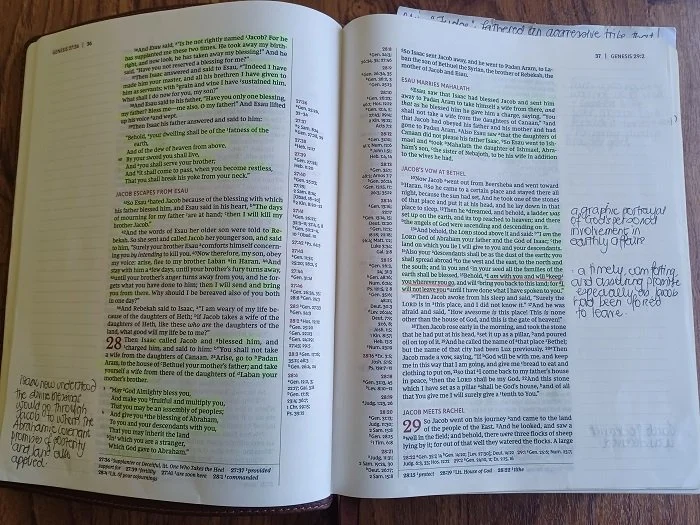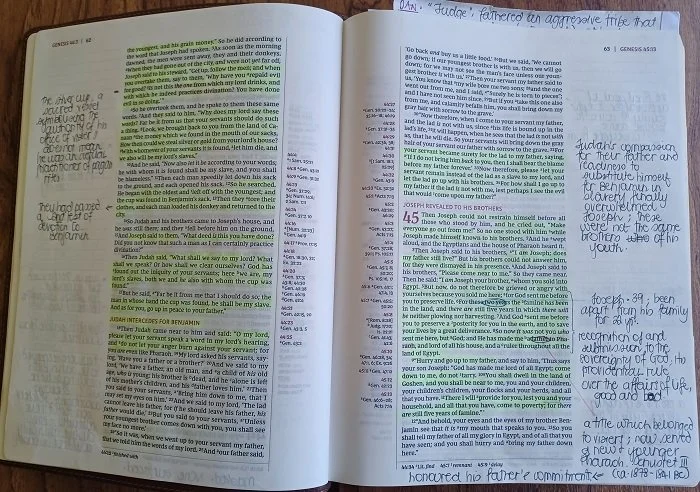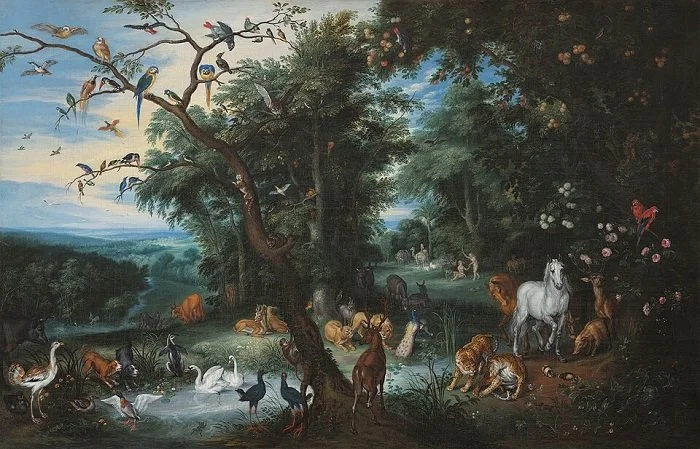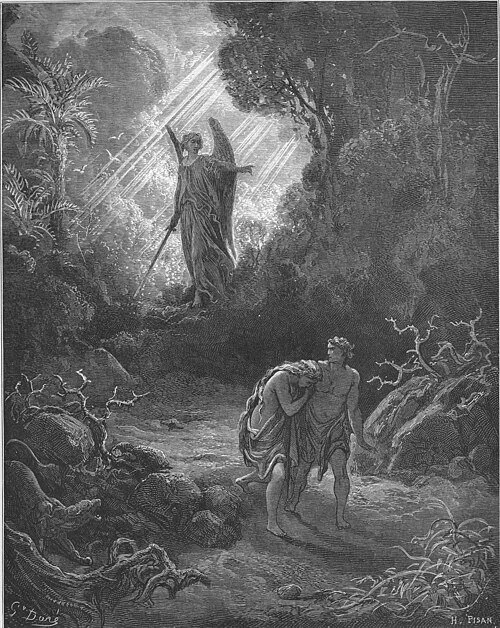Bible Study Notes - Genesis Chapters 1-3
(Image from Pinterest)
‘Scripture taken from the New King James Version. Copyright © 1982 by Thomas Nelson. All rights reserved.’
When I first started studying the Bible at the beginning of this year, I went into it very carefully and hardly made any notes… probably because I was reluctant to write in my nice, new Bible.
Beginning pages of my journaling Bible - barely any notes
It was only as I got into the middle of Genesis that I started to find my stride and relaxed into it.
About a third of the way into ‘Genesis’
The last third of ‘Genesis’ has a lot more notes!
So, there isn’t really much to share from the first half of Genesis.
And to reiterate from last week’s post, I use the NKJV Journalling Bible and Study Bible.
Journalling Bible and the study Bible above it
The main highlighter I use is a yellow one – and yes, there are times I highlight A LOT – and an orange one to highlight selected verses that are referenced in other books of the Bible; those are listed down the middle right and left side of the pages.
To highlight particular phrases and names, I use colour pencils, which works out a lot cheaper and I don’t have to worry about anything bleeding through to the other pages, and for the notes, I just use a plain old black BIC ballpoint.
In Genesis, there are three geographical settings:
Mesopotamia (chapters 1 to 11)
Canaan, the Promised Land (chapters 12 to 36)
Egypt (chapters 37 to 50)
When researching different ways of studying the Bible, one thing that repeatedly came up was to look for repeated words and phrases.
In chapter 1, for each of the six days, God said “Let…”, and whatever He spoke came into being.
In 1:26, ‘God said, “Let Us make man in Our image…”’; we’re set apart from the rest of creation because we are the only ones who have been made in God’s image.
Also, God said, “Us” – the early church fathers believed this was an expression of the Trinity, that God is One in three Persons: God the Father, God the Son, and God the Holy Spirit; here, the Father was ‘speaking in the fulness of His divine creative power to the Son and the Holy Spirit.’
In 2:17, ‘God commanded the man… “Of every tree of the garden you may freely eat; but of the tree of the knowledge of good and evil you shall not eat, for in the day that you eat of it you shall surely die.”’ – the ‘die’ here refers to spiritual death.
And so, all was perfect in God’s Kingdom with perfect relationships between God and his creation, between man and woman, and between them and the rest of creation.
‘The Garden of Eden’ by Izaak van Oosten (W.Commons)
In 3:5, the serpent worked to persuade the woman to disobey God and eat the fruit, saying ‘“… you will be like God, knowing good and evil.”’
Before I began studying the Bible, I thought the word ‘knowing’ here meant ‘comprehending’ or ‘recognising’, basically the way we use the word ‘know’ today, and so I struggled to understand why that would be a bad thing; surely, it only benefits us to know the difference between good and evil.
But it means more than that, it’s to do with deciding what is right and wrong.
Their sin of eating the fruit forbidden to them wasn’t only about disobeying God but about becoming law-makers, to be like God.
In 3:9, when ‘God called to Adam… “Where are you?”’, it wasn’t an angry call, for obviously He knew where they were, but He also knew their perfect relationship had been broken.
God still calls us even when, for whatever reason, we hide from Him.
In 3:11, God addressed Adam directly: ‘“… Have you eaten from the tree of which I commanded you that you should not eat?”’
Instead of taking responsibility – God had put him in charge as shown in 2:17, quoted above – Adam’s answer blamed his wife AND God: ‘“The woman whom You gave to be with me, she gave me of the tree, and I ate.”’
To quote Charles Spurgeon, “He was guilty of unkindness to his wife and of blasphemy against his Maker, in seeking to escape from confessing the sin which he had committed. It is an ill sign with men when they cannot be brought frankly to acknowledge their wrong-doing.”
The first time I read 3:15, the latter part of what God said to the serpent, I missed the key reference to the Messiah, and His ultimate defeat of Satan:
‘“And I will put enmity
Between you and the woman,
And between your seed and her Seed;
He shall bruise your head,
And you shall bruise His heel.”’
“This is the first gospel sermon that was ever delivered upon the surface of this earth. It was a memorable discourse indeed, with Jehovah Himself for the preacher, and the whole human race and the prince of darkness for the audience.” – Charles Spurgeon.
In 3:21, even though He banished them from the garden, God still showed His mercy by first clothing Adam and Eve, and from this we see that no matter what we do, He still provides for us.
But because they had disobeyed Him and sinned, ‘“… He drove out the man; and He placed cherubim at the east of the garden of Eden…”’
‘The expulsion from the garden’, illustration by Gustave Dore (W.Commons)
And so, sin and death entered the world.
In chapter 4, Cain murders Abel, both the children of Adam and Eve.
In chapter 5, the repeating phrase in the genealogy of the family of Adam is ‘… and he died’, like a funereal refrain.
In chapter 6, man’s wickedness had grown so great with ‘every intent of the thoughts of his heart… only evil…’
How that must have hurt and disappointed God: ‘And the Lord was sorry that He had made man on the earth, and He was grieved in His heart’; He decided to destroy man and beast.
And there the whole story could have ended, but not all was lost.
There’s a glimmer of hope with Noah, ‘a just man’ who ‘walked with God’, for he ‘found grace in the eyes of the Lord’, and so not all were destroyed when God brought down the rains and the flood.
Next week, I’ll skip ahead 10 generations from Noah to Abram, descended from Noah’s firstborn son, Shem.






